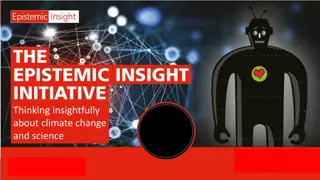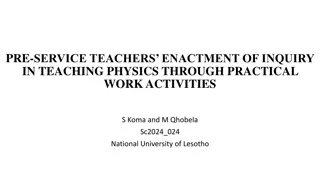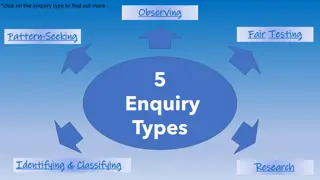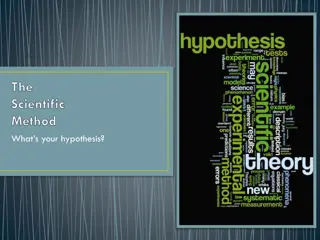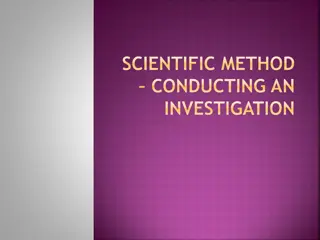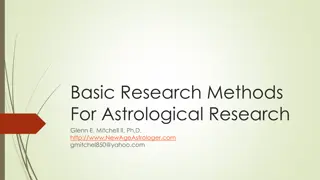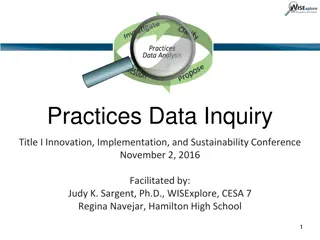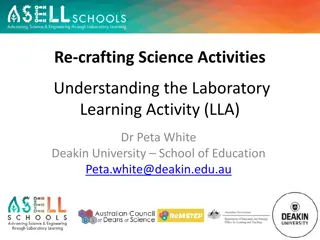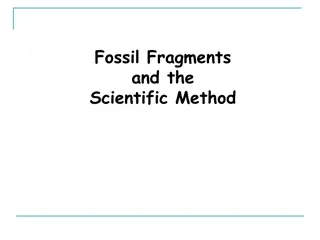Unveiling the Essence of Scientific Inquiry
Delve into the essence of scientific questioning, exploring the driving force behind scientists' day-to-day work, the elements that define science, and the significance of cause and effect in elucidating natural phenomena. Unravel the world of scientific jargon with engaging activities aimed at fostering curiosity and creativity.
Download Presentation

Please find below an Image/Link to download the presentation.
The content on the website is provided AS IS for your information and personal use only. It may not be sold, licensed, or shared on other websites without obtaining consent from the author.If you encounter any issues during the download, it is possible that the publisher has removed the file from their server.
You are allowed to download the files provided on this website for personal or commercial use, subject to the condition that they are used lawfully. All files are the property of their respective owners.
The content on the website is provided AS IS for your information and personal use only. It may not be sold, licensed, or shared on other websites without obtaining consent from the author.
E N D
Presentation Transcript
Asking Scientific Questions Activity PowerPoint Slides
What drives the day-to-day work of scientists? Investigating, understanding, and developing explanations for how [the earth, the universe, systems, etc.] work. Recipes are a formula or procedure for doing or attaining something. A recipe for investigation is built from a scientific question. So how do you come up with a scientific question? Slide 2 of 19 Asking Scientific Questions
To come up with a scientific question, we must first understand the common elements that define what science is. Discuss: What is science? Slide 3 of 19 Asking Scientific Questions
To come up with a scientific question, we must first understand the common elements that define what science is. Discuss: What is science? Ultimate Goal: Explain the Natural World Slide 4 of 19 Asking Scientific Questions
How an introductory biology book defines science: Science is the experimental, hypothesis-driven investigation of phenomena to elucidate: 1. patterns in nature 2. the processes governing the formation, maintenance, and changing of those patterns Where does cause and effect fit in? Slide 5 of 19 Asking Scientific Questions
Explaining the natural world means using cause and effect! Answering questions about cause and effect has led to most of the powerful insights offered in science. Slide 6 of 19 Asking Scientific Questions
Cause and effect are such important ingredients that we have come up with different names for them in different fields of study, but they are all synonyms and mean cause and effect. Slide 7 of 19 Asking Scientific Questions
Lets demystify scientific jargon with a synonym game so you can reduce intimidation and let your brain start being creative. Synonyms for Cause Synonyms for Effect Slide 8 of 19 Asking Scientific Questions
Synonyms for Cause independent variable x driver generator process agent force factor actor source basis Synonyms for Effect dependent variable y responding variable f(x) pattern Slide 9 of 19 Asking Scientific Questions
Remember English grammar? What kind of words are cause and effect? Subject and Object Slide 10 of 19 Asking Scientific Questions
What type of word connects subjects to direct objects in a sentence? Verb So let s think of some verbs that can link all those synonyms for cause and effect. This is a third ingredient in your question. Cause, effect, and a verb! Slide 11 of 19 Asking Scientific Questions
Synonyms for Cause independent variable x driver generator process agent force factor actor source basis Verbs Synonyms for Effect dependent variable y responding variable f(x) pattern Slide 12 of 19 Asking Scientific Questions
Synonyms for Cause independent variable x driver generator process agent force factor actor source basis Verbs drives generates causes regulates controls increases decreases suppresses Synonyms for Effect dependent variable y responding variable f(x) pattern Slide 13 of 19 Asking Scientific Questions
Lets come up with some Ecology PhD thesis questions! Small group assignment: Each group will be assigned an organism. Come up with a research question that includes this organism. The organism can be the cause or effect, your choice. Example organisms: shark, grouper, seagrass, brain coral, crab, plankton Slide 14 of 19 Asking Scientific Questions
Your Questions! Remember, you must have these three ingredients in your recipe: Cause, Effect, and Verb Slide 15 of 19 Asking Scientific Questions
Lets evaluate your questions What happens if you switch the cause and effect? What happens if you change one of the words? Different questions/recipes are formed with little or no change in the words in the sentence. Those small changes can drastically change how and what you are investigating for years to come! Slide 16 of 19 Asking Scientific Questions
So coming up with your recipe is not so hard. Formulating a question that supports a recipe for investigating relationships between cause and effect also enables good communication. Slide 17 of 19 Asking Scientific Questions
Lets see if we can identify cause and effect in scientists titles! Small group assignment: Evaluate titles from recent journal articles. Identify the type of research described by the title as: establishing a cause-and-effect relationship something else Highlight the potential causal agent(s) in yellow (or underline once) and highlight the effect(s) in green (or underline twice). Slide 18 of 19 Asking Scientific Questions
What have you learned? Questions are the basis for how scientists create the recipe for research, investigation, and experimentation. Scientific recipes often have three main ingredients: cause, effect, and verb. The creativity in questions simply comes from the novelty of the words placed in those blank statements. If no one has ever looked at that cause before in relation to that effect, it s new! A basic grammar lesson becomes a key for success in forming cause- and-effect scientific questions that can be used for further investigation. Not so hard! Slide 19 of 19 Asking Scientific Questions


